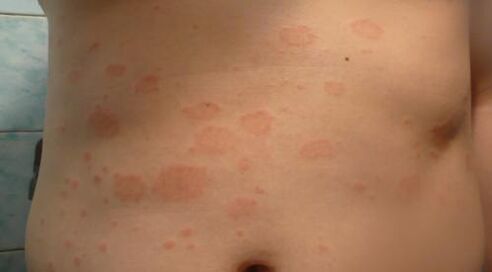Psoriasis is one of the most common chronic dermatoses: the disease causes a rash in the form of pink plaques with silver scales, often accompanied by itching.In one way or another, about 3% of the entire population of our planet is faced with this pathology, that is, we are talking about millions of people.Psoriasis can appear at any age, although most often the first signs of the disease are found either from 15 to 25 years or after 50. However, if you never had psoriasis, this does not mean that it will never appear.About how psoriasis proceeds and how it needs to be treated, everyone needs to know, since in the early stages the treatment of psoriasis is most effective.

The mechanism of development of the disease
The reasons for the development of psoriasis are a real medical secret.Scientists have been seriously exploring this disease for more than 150 years, but we still know not as much about it as we would like.
The fact that psoriasis is not an infectious disease and is not transmitted from person to person is known in the 19th century.But what causes psoriasis?Today there are several theories on this score.Perhaps the whole thing is a violation of metabolic processes, perhaps in a genetic error.However, we already know exactly what is able to provoke the development of the disease.
Changes in the immune system are to blame for everything.They can be due to genetically or occur due to the influence of some external factors.Neo-psychic factors (such as stress), skin injuries, taking some drugs (especially antibiotics), alcoholism, infectious diseases can provoke the onset of the disease.
Be that as it may, changes in the work of the body's protective system lead to the fact that the life cycle of skin cells becomes very short, they begin to share at a huge speed and do not have time to die in a natural way.So the characteristic psoriatic plaque is formed - a painful spot that rises above the skin level and covered with dry scales.This process is accompanied by inflammation: there is a secretion of inflammation mediators, supporting both inflammation itself and provoking excessive formation of skin cells.It turns out a vicious circle, and anyone who tries to cure psoriasis knows how difficult it is to break this sequence.To facilitate the condition for psoriasis and achieve persistent remission, you need to suppress inflammatory processes, as well as ensure the intensive restoration of the skin and its barrier function.
Stages of psoriasis by the degree of exacerbation
Three stages are clearly traced during the disease:
Progressive stage
This is the very beginning of the disease, and it is very stormy.Suddenly, small, no more pins, nodular rashes occur on the skin.At the top of each node, a small gray scales of the skin is noticeable.The rash grows and forms plaques, severe itching appears.Sometimes plaques are wet, and due to impaired barrier function of the skin to psoriasis, an infection may also join at this stage.
Stationary stage
After some time, the process seems to freeze - papules (inflamed nodules) do not pass, but new ones no longer appear.Plains are covered with dry skin scales or crust.During this period, inflammation subsides.
Staday of reduction
At the last stage of psoriasis, plaques are gradually reduced and resolved (usually starting from the central part, therefore, by the end of the stage, rings and bizarre patterns appear on the skin), peeling and itching pass.Very soon, only areas of the skin slightly different in color slightly differ in psoriatic plaques.
This is the completion of the cycle of psoriasis, but not recovery.The whole process can be repeated at any time.If psoriasis is not treated, it will occur again and again almost monthly.
It is important to know
Alcohol for psoriasis is extremely harmful.According to some estimates, people who abuse alcohol suffer from psoriasis about 5 times more often than those who are indifferent to drink.

Stages of the disease according to the degree of damage
Psoriasis is also classified by the severity of lesions, dividing it into light, medium and severe shapes.The difference between them is in the area of affected skin.It is not difficult to calculate this figure even without the participation of a specialist: the open palm of an adult is about 1% of the entire surface of the skin.
- A mild form of psoriasis is called cases when less than 3% of the skin surface is affected.
- The average degree is from 3 to 10% of the skin surface.
- A severe degree - 10% of the total skin and more.
If psoriasis struck the joints, it is a severe degree - regardless of what area of the skin suffered.
In medical practice, there are several shirts to assess the severity of psoriasis.They evaluate different factors - from the area of skin lesions to the level of activity of the disease.Most often, the so -called PASI index is used to determine the severity of psoriasis.
How to recognize psoriasis at an early stage
Treatment of psoriasis is most effective at the earliest stage.Therefore, it is so important to make a diagnosis on time.To say, you have psoriasis or some other skin disease, can only a dermatologist.However, you yourself can recognize this disease by several characteristic features:
- Most often, psoriasis is initially manifested on the bends of the arms and legs, at the hair growth line or where the clothes are tightly touched with the body or the third - under the belt of trousers, various rubber bands or straps.
- At the beginning of the disease, a strongly itchy rash appears, covered with gray or silver skin scales, which are very easily removed.
- If you remove the scales, a thin, brilliant and slightly wet skin will be found under it.
- If you scrape the plaque with a kind of spatula, removing the scales, then blood will appear on the spot in the form of the smallest drops.However, the last way is better not to use for independent determination of psoriasis - it is very easy to bring an infection.
For complete confidence, you need to consult a doctor, since patients themselves often confuse psoriasis with various types of lichen or allergic dermatitis and use inappropriate drugs for treatment.
What to do if you find symptoms of the initial stage of psoriasis?
Psoriasis cannot be cured once and for all, so the main goal of therapy is to achieve a persistent and as long remission as possible.You should know that without proper treatment, psoriasis quickly acquires a chronic character: exacerbations can occur up to 9 times a year, with a duration of up to 15 days.What to do if you suspect psoriasis?Often, people, having discovered the signs of this disease, make a big mistake, resorting to “heavy artillery” - hormonal ointments without consulting a doctor.Usually, patients explain a similar step by what they allegedly heard from friends that such funds help quickly.This is a big mistake!
What is the danger of such a self -medication?Hormonal ointments from psoriasis have a lot of side effects and contraindications.Applying them without a strict recommendation of the doctor by the duration of use, frequency, area of application to the body, as well as without taking into account the individual characteristics of your body, it is extremely undesirable.
For the effective treatment of psoriasis in the early stages, non -hormonal agents should be used, for example, based on zinc pyrithion.Zinc pyrithion, or active zinc, is a very effective remedy for the treatment of psoriasis, which has a comprehensive effect:
- suppresses excessive reproduction of skin cells and inflammation, reducing peeling and the formation of psoriatic plaques;
- relieves itching;
- protects damaged skin from bacterial and fungal infections;
- Restores the lipid layer and protective functions of the skin.
The zinc pyrithion does not cause cancellation syndrome, and the list of contraindications and side effects is minimal.The effectiveness of zinc pyridion in the treatment of psoriasis, including in comparison with hormonal drugs, is confirmed by a number of Russian and foreign studies.
The beneficial effect of ultraviolet radiation on the course of psoriasis has long been known.If you have such a diagnosis, try to go to the southern resorts with mineral springs during the vacation, where psoriasis is treated, balneotherapy, along with moderate sunbathing, gives a very good effect.























